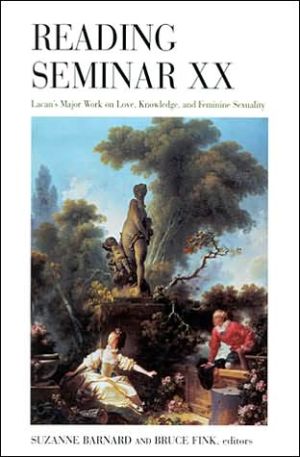

 |

|

The average rating for Reading Seminar XX: Lacan's Major Work on Love, Knowledge, and Feminine Sexuality based on 2 reviews is 3.5 stars.
Review # 1 was written on 2017-08-21 00:00:00 Clinton Smith Clinton SmithIt should be stated at the outset: this collection is not essential for the comprehension of Lacan's 1972 Seminar XX. Seminar XX is a largely comprehensible text with a few kernels of extreme complexity. Reading Seminar XX does little to put some of the more contentious points in a relevant theoretical frame in relation to the ever-popular gender theory of today's academy. Still, the majority of these essays do have something to offer. Since time is at a premium for most of us, I would recommend only reading the essays by Suzanne Barnard, Bruce Fink, and Colette Soler. These three thinkers are unparalleled and their work in this collection is exemplary. Fink, in particular, does the most work to clarify what might be a little obscure about Seminar XX. Furthermore, he positions the concerns of Seminar XX in relation to Lacan's other work in a way none of the other authors here even attempt. It is worth noting, however, that Fink's chapter, "Knowledge and Jouissance" in this collection, is anthologized in Lacan and Science (2002) as "Knowledge and science: fantasies of the whole." Renata Salecl's piece is enjoyable enough and thankfully brief. Paul Verhaeghe is an attentive and comprehensive reader of Lacan. Still, his chapter is lengthy, dry, and for specialists only. Andrew Cutrofello's chapter will be of interest to analytic philosophers, but no one else. The two sore spots in this collection are the contributions by Slavoj Zizek and Geneviève Morel. They are atrocious and traffic in the most juvenile and obtuse misreadings of Lacan imaginable. Lacan's theory of sexuation is so contentious precisely because it seems, at first glance, to embrace a number of crude gender stereotypes. A reader intent on condemning Lacan might call him a misogynist who simply pays lip service to opposing biological determinism by arguing that his notions of "sex" are based on psychic structure rather than biology. This would be an oversimplification of Lacan, however, which should be evident by paying Seminar XX the respect it is due. Lacan's apparent crudeness is offered a powerful counterweight by lines like, "One must use things like that, old words, as stupid as anything, but really use them, work them to the bone" (60). Jane Gallop, in particular, has made much of the finer details of Seminar XX that make Lacan's theory of sexuation a worthy interlocutor with feminism. Fink is also aware of the caution with which Seminar XX must be approached. In his contribution to Reading Seminar XX he writes, "Has Lacan introduced all kinds of fantasies of his own in this theorization of jouissance? The same old fantasies?" (43). But the question of these fantasies and the possibility of a constructive encounter between feminism and psychoanalysis is entirely foreclosed by Zizek and Morel. And through no fault of Lacan! Zizek and Morel embrace the face-value gender stereotypes that a poor Lacan reader might take him to task for embracing. Their entire engagement with Seminar XX is premised on their inability to read Lacan and their unwillingness to separate sexuation from biological sex and acknowledge the psychic component of sex Lacan is attempting to articulate. Zizek and Morel even fail to recognize the most basic element of Lacanian sexuation ' that "there is no sexual relation"! Both theorists seem intent to suggest there is some kind of necessary complementarity between two bifurcated sexes, an idea Lacan explicitly repudiates. Though I'm sure Zizek and Morel have offered quality readings of Lacan elsewhere, these particular essays are worth less than the paper they are printed on. They do more harm than good in demystifying one of Lacan's most important works. |
Review # 2 was written on 2018-03-06 00:00:00 Natalie Kay Natalie KayIt is hard to rate Reading Seminar XX, which includes some of the same old names that keep turning up in every essay collection from this period. Nonetheless, this book did manage to surprise me - the first three chapters, in particular, are worth the price of admission. The first of these three outstanding chapters is by Bruce Fink, whose work I normally dislike due to its blandness. However, Fink does an excellent in delineating the split between knowledge and desire in Lacan's theory of subjectivity, and how this evolves from the early period up to Seminar XX. Definitely the best piece by Fink that I have come across. The second is an essay on hysteria by Colette Soler, whose work I like even less. Soler's chapter is not genuinely groundbreaking, but I thought its discussion of the hysteric and the way it produces knowledge/mastery was really well done. The third and final essay is by Slavoj Žižek, who articulates the implications of the theory of the "not-all" that appears in Seminar XX. This piece is particularly important for how it anticipates the relationship between Judaism and Christianity that will be explored in The Neighbor: Three Inquiries in Political Theology. The rest of the essays in this book, unfortunately, are blandly academic and not of great interest, but these three opening chapters provide some great critical insights into Seminar XX. |
CAN'T FIND WHAT YOU'RE LOOKING FOR? CLICK HERE!!!